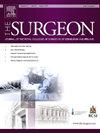经导管动脉栓塞(TAE)治疗继发于胃癌的急性上消化道出血:系统回顾和荟萃分析。
IF 2.3
4区 医学
Q2 SURGERY
Surgeon-Journal of the Royal Colleges of Surgeons of Edinburgh and Ireland
Pub Date : 2024-10-15
DOI:10.1016/j.surge.2024.09.009
引用次数: 0
摘要
导言:继发于胃癌的急性上消化道出血(UGIB)因其高发病率和高死亡率而成为一项重大的临床挑战。经导管动脉栓塞术(TAE)已成为治疗这种疾病的一种潜在疗法,尤其是在内镜治疗失败的情况下。本系统性综述旨在评估经导管动脉栓塞治疗胃癌引起的急性上消化道(GI)出血的有效性和安全性:方法:对医学数据库(包括 PubMed、MEDLINE 和 EMBASE)中 2000 年至 2023 年间发表的研究进行了系统检索。纳入的研究报告了胃癌急性上消化道出血TAE的使用情况,包括回顾性分析、病例报告和队列研究。结果:共有 7 项研究符合纳入标准,均为回顾性研究。TAE 的总体技术成功率为 94.9%。总体临床成功率为 72%,95% 置信区间 (CI) 为 66-79%。总体再出血率为 11%,95% 置信区间为 3-18%。据报告,2.4%的患者出现重大并发症,包括缺血性并发症和器官穿孔。30天的总死亡率为26.4%,主要是由于潜在的疾病进展而非手术并发症:结论:TAE是治疗胃癌继发急性上消化道出血的一种有效而安全的干预措施,成功率高。对于这种具有挑战性的疾病,TAE应被视为一种可行的治疗方式,尤其是对于考虑接受新辅助治疗的患者或不适合接受根治性手术治疗的患者。本文章由计算机程序翻译,如有差异,请以英文原文为准。
Transcatheter arterial embolisation (TAE) to treat acute upper gastrointestinal bleeding secondary to gastric cancer: A systematic review and meta-analysis
Introduction
Acute upper gastrointestinal bleeding (UGIB) secondary to gastric cancer presents a significant clinical challenge due to its high morbidity and mortality rates. Transcatheter arterial embolisation (TAE) has emerged as a potential therapeutic option for managing this condition, especially in the context of failed endoscopic management. This systematic review aims to evaluate the efficacy and safety of TAE in treating acute upper gastrointestinal (GI) bleeding caused by gastric cancer.
Methods
A systematic search of medical databases, including PubMed, MEDLINE, and EMBASE, was conducted for studies published between 2000 and 2023. Included studies reported on the use of TAE for acute upper GI bleeding specifically due to gastric cancer, including retrospective analyses, case reports, and cohort studies. Demographics and clinical outcomes were reported.
Results
A total of 7 studies met the inclusion criteria, all being retrospective in nature. The overall technical success rate of TAE was 94.9 %. Overall clinical success rates were 72 % with a 95 % confidence interval (CI) of 66–79 %. Overall rebleeding rates were 11 % with a 95 % CI of 3–18 %. Major complications were reported in 2.4 % of patients, including ischemic complications and organ perforation. The overall 30-day mortality rate was 26.4 %, primarily due to underlying disease progression rather than procedural complications.
Conclusion
TAE is an effective and safe intervention for managing acute upper GI bleeding secondary to gastric cancer, with high success rates. TAE should be considered a viable treatment modality for this challenging condition, particularly for patients who are being considered for neoadjuvant therapy or indeed those not suitable candidates for curative surgical intervention.
求助全文
通过发布文献求助,成功后即可免费获取论文全文。
去求助
来源期刊
CiteScore
4.40
自引率
0.00%
发文量
158
审稿时长
6-12 weeks
期刊介绍:
Since its establishment in 2003, The Surgeon has established itself as one of the leading multidisciplinary surgical titles, both in print and online. The Surgeon is published for the worldwide surgical and dental communities. The goal of the Journal is to achieve wider national and international recognition, through a commitment to excellence in original research. In addition, both Colleges see the Journal as an important educational service, and consequently there is a particular focus on post-graduate development. Much of our educational role will continue to be achieved through publishing expanded review articles by leaders in their field.
Articles in related areas to surgery and dentistry, such as healthcare management and education, are also welcomed. We aim to educate, entertain, give insight into new surgical techniques and technology, and provide a forum for debate and discussion.

 求助内容:
求助内容: 应助结果提醒方式:
应助结果提醒方式:


